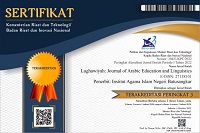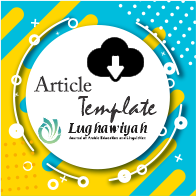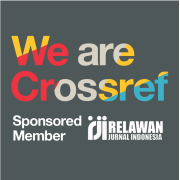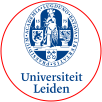ARABIC LEARNING IN THE DIGITAL ERA: APPROACH IN ONLINE SYSTEM
Abstract
One alternative to learning Arabic in the digital era is through online learning using digital technology. The process of learning Arabic in Indonesia has developed rapidly in recent times. The transition from face-to-face to online classes requires adjustments in the learning approach. This research used literature review method. Sources of data were books, articles, and other relevant sources. Data were analyzed through data collection procedures, data grouping, data display, and drawing conclusion. The validity of the data was tested through source and technical triangulation. The result of the study indicated that there are three appropriate approaches for learning Arabic online in this digital era, namely the contextual approach, constructivism approach, and behaviorism approach. The choice of approach should meet the students’ needs and learning conditions. Each approach could be implemented through a variety of methods and techniques. The integration of these three approaches in learning Arabic online provides broad opportunities for students to study independently and develop language skills aspects through various available digital media platforms.
Keywords
Full Text:
PDFReferences
Abdelhadi, R., Hameed, L., Khaled, F., & Anderson, J. (2019). Creative interactions with art works: an engaging approach to Arabic language-and-culture learning. Innovation in Language Learning and Teaching, 0(0), 1–17. https://doi.org/10.1080/17501229.2019.1579219
Ainin. (2020). Pengembangan Kurikulum dalam Pembelajaran Bahasa Arab (1st ed.). Lisan Arabi.
Akbari, E., Naderi, A., Simons, R.-J., & Pilot, A. (2016). Student engagement and foreign language learning through online social networks. Asian-Pacific Journal of Second and Foreign Language Education, 1(1), 1–22. https://doi.org/10.1186/s40862-016-0006-7.
AlGhamdi, M. A. (2018). Arabic Learners’ Preferences for Instagram English Lessons. English Language Teaching, 11(8), 103. https://doi.org/10.5539/elt.v11n8p103
Anggraini, D. (2019). Langugae Learning Model for 4.0 Industrial Revolution: Combining Inquiry Model and Contextual Teaching Learning Based on Local Wisdom Value. 125–134.
Arndt, H. L., & Woore, R. (2018). Vocabulary learning from watching YouTube videos and reading blog posts. Language Learning and Technology.
Bahruddin, U., & Febriani, S. R. (2020). Implementation of Krashen ’ s Theory in Language Acquisition Stephen. International Journal of Innovation, Creativity and Change, 13(8), 821–831.
Bostancıoğlu, A., & Handley, Z. (2018). Developing and validating a questionnaire for evaluating the EFL ‘Total PACKage’: Technological Pedagogical Content Knowledge (TPACK) for English as a Foreign Language (EFL). Computer Assisted Language Learning, 31(5–6), 572–598. https://doi.org/10.1080/09588221.2017.1422524.
Bugawa, A. M., & Mirzal, A. (2018). The impact of web 2.0 technologies on the learning experience of students in higher education: A review. International Journal of Web-Based Learning and Teaching Technologies, 13(3), 1–17. https://doi.org/10.4018/IJWLTT.2018070101.
Carrier, M., Damerow, R. M., & Bailey, K. M. (2017). Digital language learning and teaching: Research, theory, and practice. Digital Language Learning and Teaching: Research, Theory, and Practice, 22(1), 1–264. https://doi.org/10.4324/9781315523293.
Chuang, H. H., Weng, C. Y., & Chen, C. H. (2018). Which students benefit most from a flipped classroom approach to language learning? British Journal of Educational Technology, 49(1), 56–68. https://doi.org/10.1111/bjet.12530.
Davis, K., & Fullerton, S. (2016). Connected learning in and after school: Exploring technology’s role in the learning experiences of diverse high school students. Information Society, 32(2), 98–116. https://doi.org/10.1080/01972243.2016.1130498.
Dhawan, S. (2020). Online Learning: A Panacea in the Time of COVID-19 Crisis. Journal of Educational Technology Systems, 49(1), 5–22. https://doi.org/10.1177/0047239520934018
Dočekal, V., & Tulinská, H. (2015). The Impact of Technology on Education Theory. Procedia - Social and Behavioral Sciences, 174, 3765–3771. https://doi.org/10.1016/j.sbspro.2015.01.1111.
Febriani, Suci Ramadhanti, Wayuni, Muhamad Bisri, Wildana, W. (2020). استراتيجيات تعليم مهارة الكلام على ضوء النظرية السلوكية في معهد الأنصار بادنج سيدمبوآن. 8(1), 1–16.
Febriani, S. R., Wargadinata, W., Syuhadak, S., & Adam, F. M. (2020). Design of Arabic Learning for Senior High School in the 21 st Century. 12(1), 1–21. https://doi.org/10.24042/albayan.v12i1.5886.
Febriani, S. R., Widayanti, R., Amrullah, M. A., & Mufidah, N. (2020). Arabic Learning for Elementary School During COVID-19 Emergency in Indonesia. OKARA, 14(1), 67–80. https://doi.org/10.19105/ojbs.v14i1.3194.
Freeman, I. M., Ed, D., & Ave, E. A. (2016). Life Skills for 21 st Century Learners. 3(10), 49–52.
Guillén, G., Sawin, T., & Avineri, N. (2020). Zooming out of the crisis: Language and human collaboration. Foreign Language Annals, 53(2), 320–328. https://doi.org/10.1111/flan.12459.
Hamat, A., & Hassan, H. A. (2019). Use of social media for informal language learning by Malaysian University Students. 3L: Language, Linguistics, Literature, 25(4), 68–83. https://doi.org/10.17576/3L-2019-2504-05.
Huang, S. C. (2018). Language learning strategies in context. Language Learning Journal, 46(5), 647–659. https://doi.org/10.1080/09571736.2016.1186723.
Kamarudin, M. Y., Yusoff, N. M. R. N., Yamat, H., & Abdul Ghani, K. (2016). Inculcation of Higher Order Thinking Skills (HOTS) in Arabic Language Teaching at Malaysian Primary Schools. Creative Education, 07(02), 307–314. https://doi.org/10.4236/ce.2016.72030.
Kessler, G. (2018). Technology and the future of language teaching. Foreign Language Annals, 51(1), 205–218. https://doi.org/10.1111/flan.12318.
Krebt, D. M. (2017). The Effectiveness of Role Play Techniques in Teaching Speaking for EFL College Students. Journal of Language Teaching and Research, 8(5), 863. https://doi.org/10.17507/jltr.0805.04.
Lee, L. (2017). Learners’ perceptions of the effectiveness of blogging for L2 writing in fully online language courses. International Journal of Computer-Assisted Language Learning and Teaching, 7(1), 19–33. https://doi.org/10.4018/IJCALLT.2017010102
Li, V. (2017). Social Media in English Language Teaching and Learning. International Journal of Learning and Teaching. https://doi.org/10.18178/ijlt.3.2.148-153.
Nassiri, N., Lakhouaja, A., & Cavalli-Sforza, V. (2018). Arabic readability assessment for foreign language learners. Lecture Notes in Computer Science (Including Subseries Lecture Notes in Artificial Intelligence and Lecture Notes in Bioinformatics), 10859 LNCS, 480–488. https://doi.org/10.1007/978-3-319-91947-8_49.
Nazari, N., Nafissi, Z., Estaji, M., Marandi, S. S., & Wang, S. (2019). Evaluating novice and experienced EFL teachers’ perceived TPACK for their professional development. Cogent Education, 6(1), 1–26. https://doi.org/10.1080/2331186X.2019.1632010.
Panagiotidis, P. (2018). Technology as a Motivational Factor in Foreign Language Learning. European Journal of Education, 1(3), 43. https://doi.org/10.26417/ejed.v1i3.p43-52.
Papi, M., & Hiver, P. (2020). Language Learning Motivation as a Complex Dynamic System: A Global Perspective of Truth, Control, and Value. Modern Language Journal. https://doi.org/10.1111/modl.12624.
Rahman, Sopandi, W., Widya, R. N., Yugafiat, R. (2019). Literacy in The Context of Communication Skills for The 21st Century Teacher Education in Primary School Student. International Journal of Science and Applied Science: Conference Series, 3 (1), 101-108. https://jurnal.uns.ac.id/ijsascs/article/view/32462/25876.
Raygan, A., & Moradkhani, S. (2020). Factors influencing technology integration in an EFL context: investigating EFL teachers’ attitudes, TPACK level, and educational climate. Computer Assisted Language Learning, 0(0), 1–22. https://doi.org/10.1080/09588221.2020.1839106.
Richardson, J. C., Besser, E., Koehler, A., Lim, J., & Strait, M. (2016). International Review of Research in Open and Distributed Learning Instructors ’ Perceptions of Instructor Presence in Online Learning Environments. International Review of Research in Open and Distributed Learning, 17(4), 1–14.
Sadiku, L. M. (2015). The Importance of Four Skills Reading, Speaking, Writing, Listening in a Lesson Hour. European Journal of Language and Literature, 1(1), 29. https://doi.org/10.26417/ejls.v1i1.p29-31.
Samiril Taurus Tamaji. (2019). Pembelajaran Bahasa Arab dengan Pendekatan Contekstual Teacing and Learning (CTL). Universitas Negeri Malang, 46.
Shakirova, A. A., & Valeeva, R. A. (2016). Humanistic educational technologies of teaching foreign languages. Mathematics Education, 11(1), 151–164. https://doi.org/10.12973/iser.2016.21014a.
Sipayung, H. D., Sani, R. A., & Bunawan, W. (2018). Collaborative Inquiry For 4C Skills. 200(Aisteel), 440–445. https://doi.org/10.2991/aisteel-18.2018.95.
Swallow, M. J. C., & Olofson, M. W. (2017). Contextual Understandings in the TPACK Framework. Journal of Research on Technology in Education, 49(3–4), 228–244. https://doi.org/10.1080/15391523.2017.1347537.
Swathi, C. H., Phil, M., & Ph, D. (2018). Humanistic Approach to Language Acquisition. 18(49042), 271–275.
Wekke, I. S. (2015). Arabic Teaching and Learning: A Model from Indonesian Muslim Minority. Procedia - Social and Behavioral Sciences, 191, 286–290. https://doi.org/10.1016/j.sbspro.2015.04.236.
Yuliyanto, A., Abdul, R., Muqodas, I., Wulandari, H., & Mifta, D. (2020). Alternative Learning of the Future Based on Verbal-Linguistic, and Visual-Spatial Intelligence Through Youtube-Based Mind Map When Pandemic Covid-19. Jurnal JPSD (Jurnal Pendidikan Sekolah Dasar), 7(2), 132–141. https://doi.org/10.12928/jpsd.v7i2.16925.
Zhou, N., & Yadav, A. (2017). Effects of multimedia story reading and questioning on preschoolers’ vocabulary learning, story comprehension and reading engagement. Educational Technology Research and Development, 65(6), 1523–1545. https://doi.org/10.1007/s11423-017-9533-2.
DOI: http://dx.doi.org/10.31958/lughawiyah.v3i1.2752
Refbacks
- There are currently no refbacks.

This work is licensed under a Creative Commons Attribution-NonCommercial 4.0 International License.
Lughawiyah Indexed By:

Lughawiyah distribute under Lisensi Creative Commons Atribusi-NonKomersial 4.0 Internasional.
View My Stats lughawiyah




















